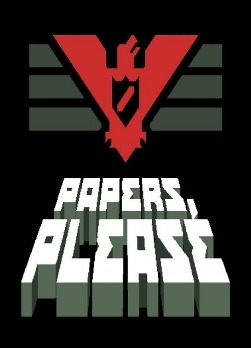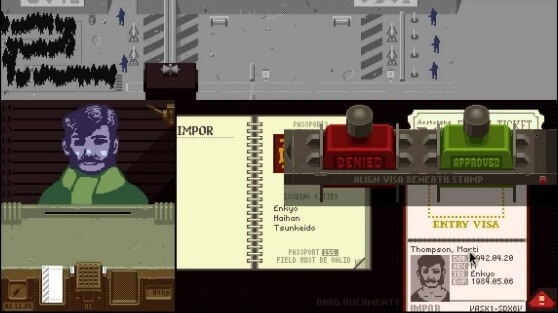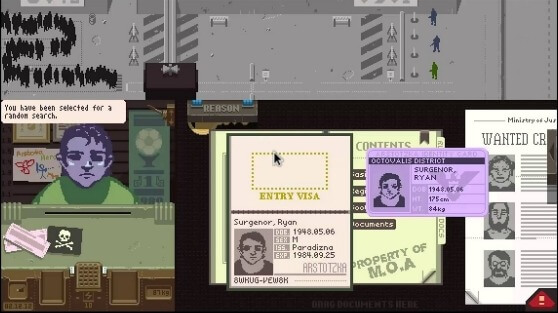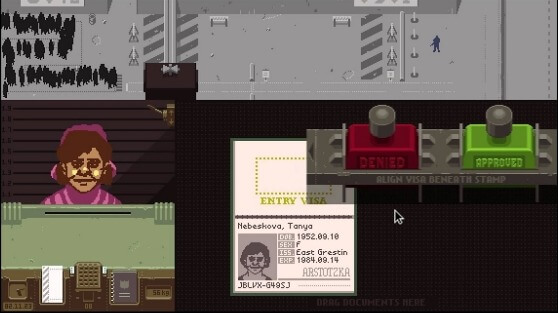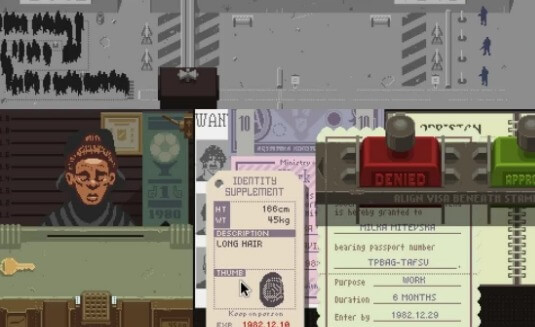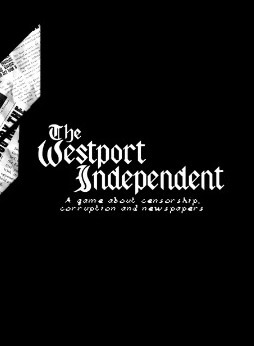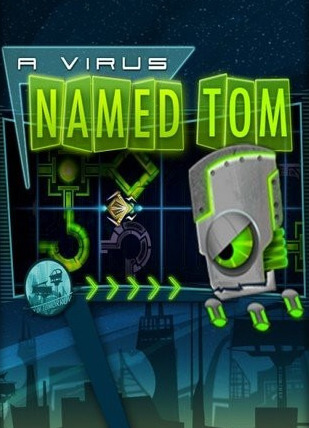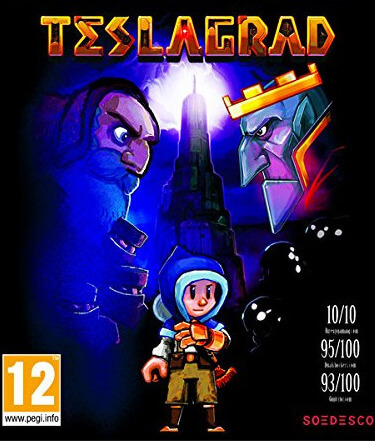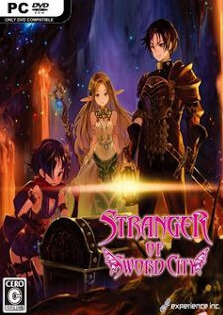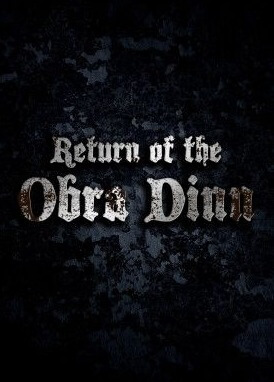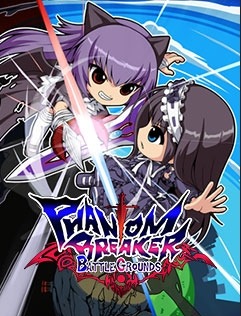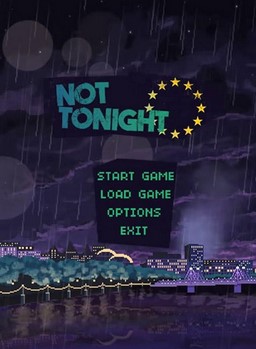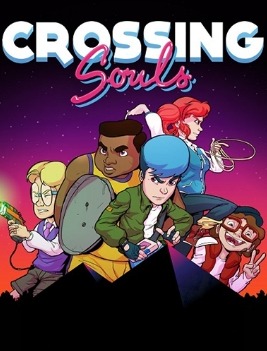Papers, Please was positively received on its release, and it has come to be seen as an example of an empathy game and a demonstration of video games as an art form. The game was recognized with various awards and nominations from the Independent Games Festival, Game Developers Choice Awards, and BAFTA Video Games Awards, and was named by Wired and The New Yorker as one of the top games of 2013. Pope reported that by 2016, more than 1.8 million copies of the title had been sold.
Gameplay
The gameplay of Papers, Please focuses on the work life of an immigration inspector at a border checkpoint for the fictional country of Arstotzka in the year 1982. At the time frame of the game, Arstotzka has recently ended a six-year long war with the neighboring country of Kolechia yet political tensions between them and other nearby countries remain high.
As the checkpoint inspector, the player reviews arrivals' documents and uses an array of tools to determine whether the papers are in order for the purpose of arresting certain individuals such as terrorists, wanted criminals, smugglers and entrants with forged or stolen documents; keeping other undesired individuals like those with no polio vaccine including anti-vaxxers, expired vaccines, missing required paperwork or expired paperwork out of the country; and allowing the rest through. For each in-game day, the player is given specific rules on what documentation is required and conditions to allow or deny entry which become progressively more complex as each day passes. One by one, immigrants arrive at the checkpoint and provide their paperwork. The player can use a number of tools to review the paperwork to make sure it is in order. When discrepancies are discovered, the player may interrogate the applicant, demand missing documents, take the applicant's fingerprints while simultaneously ordering a copy of the applicant's identity record in order to prove or clear either name or physical description discrepancies, order a full body scan in order to clear or prove weight or apparent biological sex discrepancies or find enough incriminating evidence required to arrest the entrant. There are opportunities for the player to have the applicant detained and the applicant may, at times, attempt to bribe the inspector. The player ultimately must stamp the entrant's passport (or temporary visa slip if the individual has no passport) to accept or deny entry unless the player orders the arrest of the entrant. If the player has violated the protocol, a citation will be issued to the player shortly after the entrant leaves. Generally the player can make two violations without penalty, but subsequent violations will cost the player increasing monetary penalties from their day's salaries. The player has a limited amount of real time, representing a full day shift at the checkpoint, to process as many arrivals as possible.
At the end of each in-game day, the player earns money based on how many people have been processed (5 credits for each individual that enters the booth before the shift ends) and bribes collected, less any penalties for protocol violations and then must decide on a simple budget to spend that money on rent, food, heat and other necessities in low-class housing for themselves and their family. The player must also make certain not to earn too much money in illegitimate ways, lest his family be reported and have all the money they had accumulated thus far confiscated by the government. As relations between Arstotzka and nearby countries deteriorate, sometimes due to terrorist attacks, new sets of rules are gradually added, based on the game's story, such as denying entry to citizens of specific countries or demanding new types of documentation. The player may be challenged with moral dilemmas as the game progresses, such as allowing the supposed spouse of an immigrant through despite lacking complete papers at the risk of accepting a terrorist into the country. The game uses a mix of randomly generated entrants and scripted encounters. Randomly generated entrants are created using templates.
A mysterious organization known as EZIC also appears, with several of its members appearing at the checkpoint, giving the inspector orders to help bring down the government and establish a new one; the player can choose whether to help this organization or not, letting their members through to assassinate certain powerful individuals the organization deems too corrupt to live and even personally killing two rival agents for the organization.
The game has a scripted story mode with twenty possible endings depending on the player's actions, as well as some unlockable randomized endless-play modes.
Reception
Papers, Please received positive reviews on release, receiving "generally favorable reviews" from 40 reviews on Metacritic. Papers, Please has been praised for the sense of immersion provided by the game mechanics, and the intense emotional reaction. CBC News' Jonathan Ore called Papers, Please a "nerve-racking sleuthing game with relentless pacing and dozens of compelling characters – all from a desk job". Simon Parkin writing for The New Yorker blog declared Papers, Please the top video game of 2013. He wrote: "Grim yet affecting, it’s a game that may change your attitude the next time you’re in line at the airport." Some critics received the story very well: Ben "Yahtzee" Croshaw of The Escapist's series Zero Punctuation lauded the game for being a truly unique entry for 2013 and even made it one of his top five games for that year; he cited the game's morality as his reasoning by explaining that "Papers, Please presents us constant moral choices, but makes it really hard to be a good person... while you could waive the rules to reunite a couple ... you do it at the expense of your own family... You have to decide if you want to create a better world or just look after you and yours."
Wired listed Papers, Please as their top game for 2013, recognizing that the game's title, often coupled with the Hollywood representation of Nazi officials stopping people and demanding to see their identification, alongside the drab presentation captured the ideas of living as a lowly worker in a police state. In 2019, the game was ranked 45th on The Guardian newspaper's The 50 Best Video Games of the 21st Century list.
